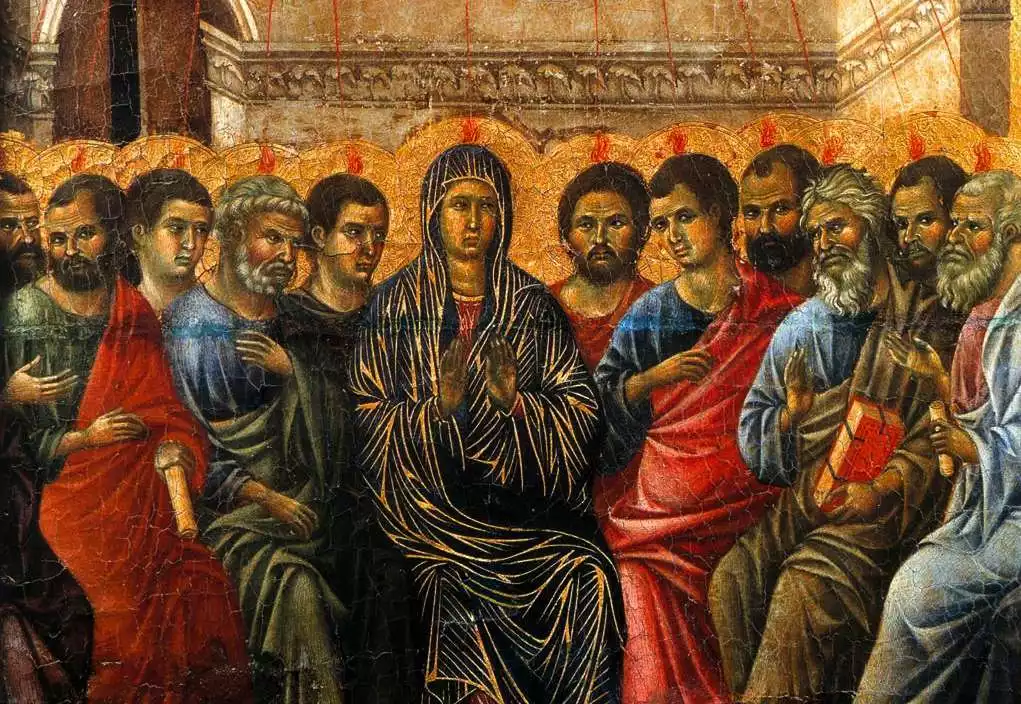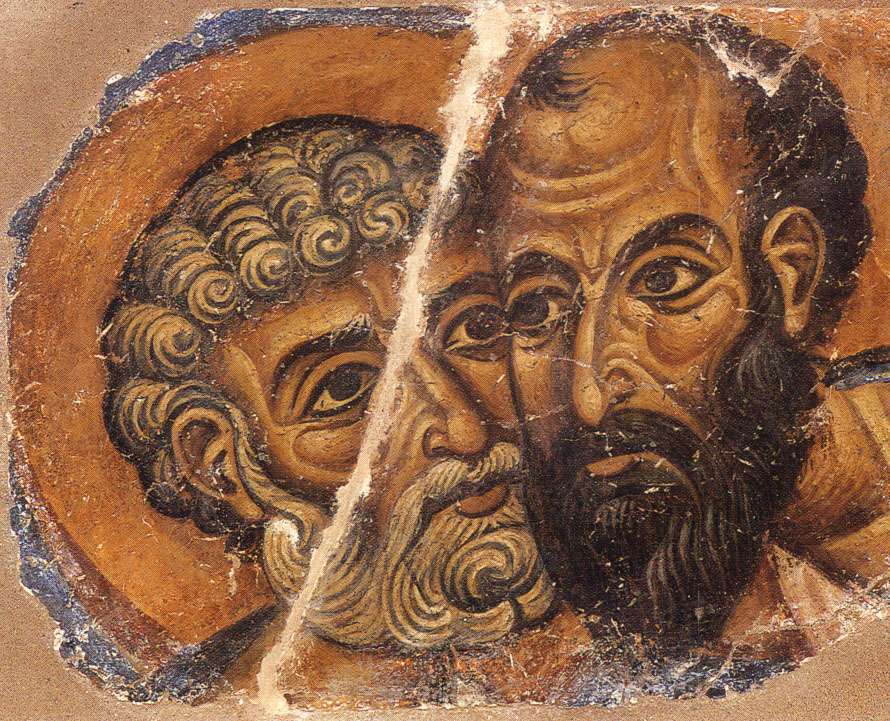
The Twelve Apostles, a group integral to the foundations of Christianity, comprised Peter, James, John, Andrew, Philip, Bartholomew, Matthew, Thomas, James son of Alphaeus, Thaddaeus, Simon the Zealot, and Judas Iscariot. These individuals, chosen by Jesus Christ during His earthly ministry, played pivotal roles in the spread of early Christian teachings. Their lives, extending from the first century AD, reflect diverse backgrounds and personalities, yet they shared a common mission of disseminating Jesus’s message. This article delves into the distinct narratives of each apostle, weaving a tapestry of early Christian history.
Peter | The Rock of the Church
Simon Peter, often hailed as the first leader of the early Christian church, holds a prominent place among the Twelve Apostles. Originally a fisherman, Peter’s life underwent a transformation following his encounter with Jesus. Renowned for his impetuous nature yet profound faith, Peter’s journey from a simple fisherman to the ‘Rock’ upon which Jesus built His church is a testament to the transformative power of faith.
Peter’s birthdate remains uncertain, but historical accounts suggest his activities primarily in the 1st century AD. He is revered for his unwavering devotion to Christ, even though he infamously denied Jesus thrice before the crucifixion. Post-resurrection, Peter emerged as a pillar of the early church, his leadership evident in the Acts of the Apostles. Tradition holds that he met martyrdom under Emperor Nero in Rome, crucified upside down at his request, feeling unworthy to die in the same manner as Christ.
His contributions to Christianity are monumental, with several New Testament writings attributed to him. Peter’s legacy lies in his role as a steadfast apostle, his life symbolizing the journey from doubt to faith, weakness to strength, and fear to courage. His story resonates with believers, epitomizing the essence of spiritual transformation and leadership.
James and John | Sons of Thunder
James and John, sons of Zebedee, were prominent figures among the Twelve Apostles. Known as the “Sons of Thunder,” a title bestowed by Jesus, they were part of Jesus’ inner circle, witnessing key events such as the Transfiguration. James, the elder brother, holds the distinction of being the first apostle martyred for his faith, as recorded in the Acts of the Apostles. His death, ordered by King Herod Agrippa around 44 AD, marked a significant moment in early Christian history.
John, on the other hand, is traditionally believed to have lived a long life, surviving his fellow apostles. He is often identified as the author of the Gospel of John, three Epistles, and the Book of Revelation, though modern scholarship debates these attributions. John’s writings are noted for their theological depth, focusing on the divinity of Christ and the nature of God’s love. The Gospel of John presents a unique perspective on Jesus’ life and teachings, distinct from the Synoptic Gospels.
Both James and John initially worked as fishermen before their call to apostleship. Their journey from fishermen to key figures in the early church highlights the transformative impact of their encounter with Jesus. Their narratives are integral to understanding the early Christian movement’s growth and the personal transformations that defined the apostolic age.
Andrew and Philip | Bringing Others to Christ
Andrew, the brother of Simon Peter, was another fisherman who became a follower of Jesus. Known for introducing his brother to Jesus, Andrew’s role as an apostle is often associated with his ability to bring others to Christ. Little is known about his later life, but various traditions suggest he preached the Gospel in different regions, including Greece, where he is said to have been martyred by crucifixion.
Philip, distinct from Philip the Evangelist in the Acts of the Apostles, is often remembered for his question to Jesus about feeding the 5,000 and his interaction with the Ethiopian eunuch, indicating his role in spreading the Gospel to the Gentiles. The New Testament depicts him as a figure of inquiry and understanding, seeking deeper knowledge and clarity in Jesus’ teachings.
The accounts of Andrew and Philip underscore the diverse backgrounds and personalities of the apostles. Their stories reflect the early church’s expansive reach, transcending cultural and geographic boundaries. Through their narratives, one gains insight into the apostolic mission’s inclusive nature, emphasizing the universal call to follow Christ and share His message with the world.

Bartholomew and Matthew | Witnesses of Transformation
Bartholomew, also known as Nathanael, is a figure shrouded in mystery within the New Testament. Despite the limited references to him, he is traditionally regarded as one of the Twelve Apostles. Bartholomew’s story is one of initial skepticism, famously questioning if anything good could come from Nazareth, only to become a firm believer after meeting Jesus. His conversion illustrates the power of personal encounter with Christ. While details of his later life and missionary work are sparse, various accounts suggest he spread the Gospel in Armenia, India, and other regions, enduring martyrdom for his unwavering faith.
Matthew, formerly known as Levi, experienced a profound transformation from a tax collector to a dedicated apostle. His previous occupation, often viewed negatively in Jewish society, highlights the inclusive nature of Jesus’ call. Matthew’s authorship of the first Gospel provides a unique perspective, particularly in portraying Jesus as the fulfillment of Old Testament prophecies. His Gospel is a bridge between the Jewish traditions and the new Christian faith, emphasizing Jesus’ role as the Messiah. Matthew’s life story serves as a testament to the transformative impact of Jesus’ teachings, showcasing the possibility of redemption and change.
Thomas and James son of Alphaeus | Embodiments of Faith and Dedication
Thomas, often dubbed ‘Doubting Thomas,’ is best known for his skepticism about Jesus’ resurrection until he personally encountered the risen Christ. This episode, far from casting a negative light, underscores the importance of personal faith and the reality of Jesus’ resurrection. Thomas’ story resonates with many who seek tangible proof of faith’s mysteries. Traditionally, Thomas is credited with establishing Christian communities in India, where he is revered as the apostle who brought Christianity to the subcontinent.
James son of Alphaeus, also known as James the Less, remains one of the more enigmatic apostles due to the scant information available about him. What stands out in the references to James is his steadfast dedication to the early Christian community. Though his individual contributions are not as prominently documented as some of his fellow apostles, James’ presence among the Twelve signifies the diverse backgrounds and roles within the early Christian movement. His life, while largely undocumented, contributes to the collective narrative of the apostles’ mission and their collective impact on the spread of Christianity.

Thaddaeus, Simon the Zealot, and Judas Iscariot | The Spectrum of Apostleship
Thaddaeus, often identified with Jude, is a figure wrapped in layers of historical and scriptural ambiguity. Despite this, he is credited as the author of the Epistle of Jude in the New Testament, a letter that emphasizes faith and warns against false teachings. His legacy, though less prominent than some of his fellow apostles, plays a crucial role in the New Testament’s canon, offering guidance and exhortation to early Christians.
Simon the Zealot, distinguished from Simon Peter, is another apostle about whom little is known. His epithet ‘the Zealot’ suggests a possible association with a Jewish political movement of the time, known for its fervent nationalism and opposition to Roman rule. Simon’s inclusion among the apostles illustrates the wide range of backgrounds and beliefs within Jesus’ followers, united by a common faith and purpose.
Judas Iscariot, notorious for his betrayal of Jesus, casts a shadow over the apostolic narrative. His actions, leading to Jesus’ arrest and subsequent crucifixion, have been subject to various interpretations and debates. Judas’ story serves as a solemn reminder of the complexities of human nature and the profound consequences of choices.
The lives of the Twelve Apostles, each unique in their backgrounds and experiences, collectively embody the early Christian movement’s diversity and depth. From fishermen to tax collectors, from the fervently faithful to the tragically flawed, their stories form an integral part of Christian history. Their individual journeys, marked by transformation, dedication, and in some cases, redemption, offer insights into the human aspect of divine calling. The Twelve Apostles’ narratives not only shaped the early church but continue to inspire and influence Christian thought and practice.
References
- Brown, Raymond E. “An Introduction to the New Testament.” Doubleday, 1997.
- History.com Editors. “Why Judas Betrayed Jesus.” History.com (accessed December 26, 2023).
- Johnson, Luke Timothy. “The Writings of the New Testament: An Interpretation.” Fortress Press, 2010.
- Lifelong Learning Institute. “Apostles: Facts & Issues.” www.uwgb.edu (accessed December 26, 2023).
- Sanders, E.P. “The Historical Figure of Jesus.” Penguin Books, 1993.
- The Editors of Encyclopaedia Britannica. “History of Early Christianity.” Britannica.com (accessed December 26, 2023).
